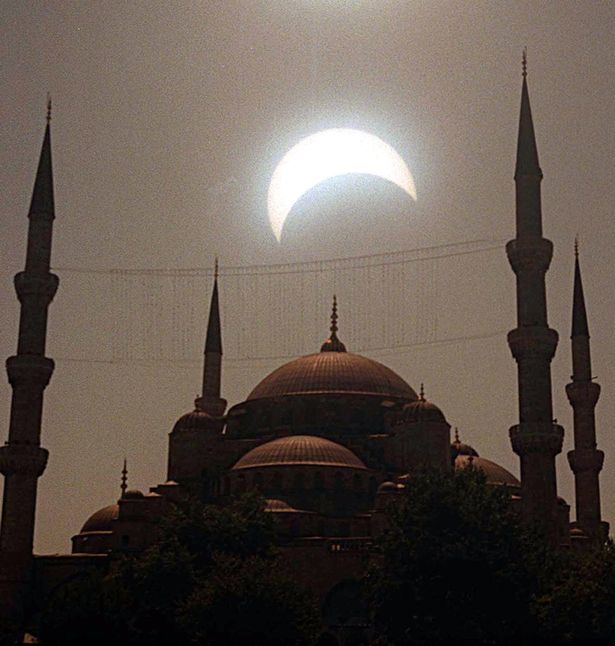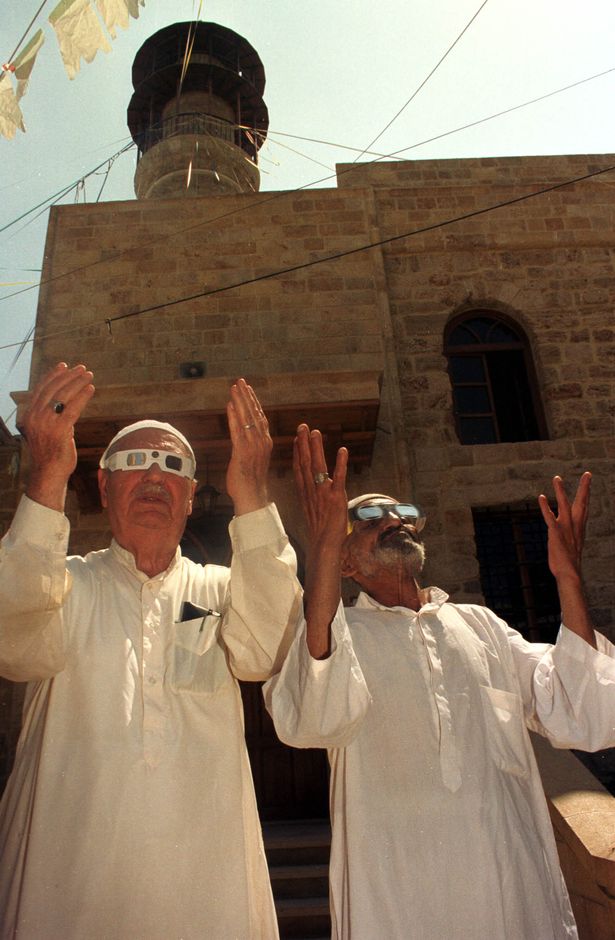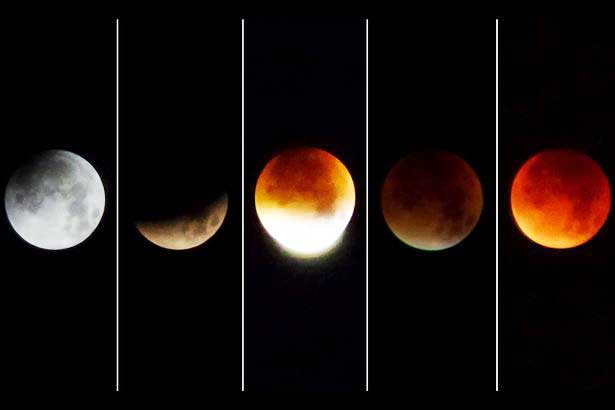Moon eclipse 2019 Muslims to say special prayers | Salat Al-Khusuf
MOON ECLIPSE 2019 MUSLIMS TO SAY SPECIAL PRAYERS DURING RARE CELESTIAL EVENT
We are about to witness a blood moon during a total lunar eclipse.
The rare event – on the night of a super-moon when the moon appears bigger than usual – will take place in the early hours of January 21.
During the eclipse, the moon will turn blood red – or at least a coppery colour – and it is admittedly an eerie and rather ominous sight.
It’s easy to imagine what ancient tribes might have thought when they saw such an astronomical phenomenon.
Even today, doomsayers claim such events herald the end of the world, quoting passages from the Book of Revelation in the Bible and also the Book of Joel in the Hebrew Bible.
And for some other religions, eclipses have their own meaning and significance.
Among them, Muslims have their own views and reactions to such events – and this is what they believe.
WHAT DO ECLIPSES MEAN IN ISLAM?

Muslim worshipers traditionally say special prayers during a solar or lunar eclipse.In the past there was much fear and superstition surrounding such events, with many believing they were a warning of impending disaster.
There was a solar eclipse when the prophet Muhammad’s son Ibrahim died and some thought the sun was darkened because of this tragedy and the grief and mourning it caused.
As the science of astronomy developed and it became possible to predict eclipses, it was clear they were not unexpected reactions to a current human event but part of the clockwork of the cosmos – the normal motions and cycles of stars, planets and moons.A sequence of photos showing the phases of the total lunar eclipse on September 28, 2015 as viewed from Warwickshire (Image: Darren Campbell)
THE PROPHET IS QUOTED AS SAYING: “THE SUN AND THE MOON ARE TWO OF THE SIGNS OF ALLAH. THEY DO NOT ECLIPSE BECAUSE OF THE DEATH OR LIFE OF SOMEONE. SO WHEN YOU SEE THEM, CALL UPON ALLAH AND PRAY AND GIVE IN CHARITY.”
But it’s still said that Allah uses eclipses to make his devotees afraid.
They are said to be a reminder of what will happen on the Day of Judgment or Day of Resurrection after the end of the world when “the sun will be wound round and will lose its light and be overthrown and the stars will fall, and the sight will be dazed, the moon will be eclipsed and the sun and moon will be joined together (by going into one another, or folded up, or deprived of their light).”

Islam QA says: “Solar and lunar eclipses are two of the signs of Allah with which He scares His slaves and reminds them of some of the things which will happen on the Day of Resurrection. This is why Muslims should be alarmed by eclipses.”
But, according to ThoughtCo: “In modern times, superstitions and fear surrounding solar and lunar eclipses have diminished.
“However, Muslims continue the tradition of praying during an eclipse, as a reminder that Allah alone has power over all things in the heavens and on earth.”
WHATEVER THE PERSONAL BELIEFS HELD TODAY, IT IS CUSTOMARY IN ISLAM TO HOLD PRAYERS DURING AN ECLIPSE BLOOD MOON ECLIPSE 2019.
The eclipse prayers consists of two rakats (cycles), each involving two bowings and two prostrations.
The moon plays an important part in Muslim life, as the Islamic calendar is based on the moon. All months and events are determined by a sighting of the first crescent of the new moon.
Source: https://www.birminghammail.co.uk/news/midlands-news/blood-moon-eclipse-muslim-prayers-15706485
PRAYER OF THE SOLAR AND LUNAR ECLIPSE (SALAT AL-KHUSUF) BLOOD MOON ECLIPSE 2019
The scholars agree that the prayer of the eclipses is a confirmed sunnah which is to be performed by both men and women. It is recommended to pray it in congregation although the congregation is not a condition for it. The sunnah is to be performed in a mosque as the Prophet (peace be upon him) went to the mosque immediately after the solar eclipse appeared. It’s also permissible for women to attend the congregation of the solar and lunar eclipse as `A’ishah and Asmaa bint Abi Bakr (may Allah be pleased with them) prayed with the Prophet at the mosque.
The people are called to it by announcing As-Salatu jami`ah “prayer in congregation.” The majority of the scholars hold that it is to consist of two rak`ahs (unit of prayer)and that in every rak`ah one is to perform two bowings (ruku`) instead of the customary one.
`A’ishah narrates: “There was a solar eclipse during the time of the Prophet (peace be upon him)and the Prophet went to the mosque, and he stood and made the takbir (saying Allah is greatest), and he put the people in rows behind him, and he made a lengthy recital during the Prayer. Next, he made the takbir and made a long bowing, but it was not as long as the recital. Following that, he raised his head, saying: ‘Allah hears him who praises Him. And to You, our Lord, belongs the praise.’ Afterward, he stood and made another long recital but it was shorter than the first one.
Again, he made the takbir and made a bowing that was shorter than the first one. Then, again he said: ‘Allah hears him who praises Him. And to You, our Lord, belongs the praise.’ After this, he prostrated. He did the same in the next rak`ahand finished four bowings and four sujud (prostration).
The sun appeared again before he finished. Finally, he stood and addressed the people and praised Allah as He deserves it and said: ‘The sun and the moon are two signs from among Allah’s signs and there is no eclipse due to someone’s death or life. If you see them occurring, hurry to pray.’” (Al-Bukhari and Muslim)
Ibn `Abbas (may Allah be pleased with him) said: “There was a solar eclipse during the life time of the Prophet (peace be upon him) and he prayed with a long standing, similar to what it takes to recite Surat Al-Baqarah. Then, he made a long bowing. After which, he stood and made another long recital but shorter than the first one. Again he went into bowing, but for a shorter time than in the first one. Following this, he made sajdah [twice].
Next he made another long standing (qiyam) which was also not as long as the first. After that, he made another lengthy bowing but it was not as long as the first one. Again, he made another long standing [and recital] but it was not as long as the first one. After which, he made another lengthy bowing but it was not as long as the previous one.
Following this, he went into prostration [and so on]. When he had finished, the sun had appeared. He concluded his prayer and said: ‘The sun and the moon are two signs from the signs of Allah, and there is no eclipse due to the death or life of anyone. If you see it, make remembrance of Allah.’” (Al-Bukhari and Muslim)
Read More – Benefits of Quran, all 114 Surahs of Holy Quran.
